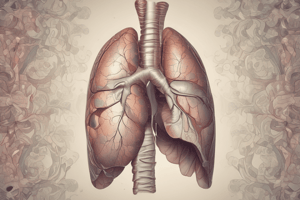Podcast
Questions and Answers
Which respiratory disease is the second most diagnosed cancer worldwide?
Which respiratory disease is the second most diagnosed cancer worldwide?
- Lung Cancer (correct)
- Asthma
- Chronic Obstructive Pulmonary Disease (COPD)
- Pneumonia
What is the leading risk factor for lung cancer?
What is the leading risk factor for lung cancer?
- Genetics
- Smoking (correct)
- Excessive sugar intake
- Exposure to loud noises
Which respiratory disease is characterized by recurrent episodes of breathlessness and wheezing?
Which respiratory disease is characterized by recurrent episodes of breathlessness and wheezing?
- Tuberculosis
- Asthma (correct)
- Pneumonia
- Chronic Obstructive Pulmonary Disease (COPD)
What is the most common chronic disease among children?
What is the most common chronic disease among children?
Which respiratory disease is characterized by airway narrowing and increased airway resistance?
Which respiratory disease is characterized by airway narrowing and increased airway resistance?
Which pre-existing lung diseases are closely associated with an increased risk of developing lung cancer?
Which pre-existing lung diseases are closely associated with an increased risk of developing lung cancer?
Which respiratory disease is NOT associated with an increased risk of developing pneumonia?
Which respiratory disease is NOT associated with an increased risk of developing pneumonia?
What common risk factor do COPD and tuberculosis share that contributes to their association according to the text?
What common risk factor do COPD and tuberculosis share that contributes to their association according to the text?
Which respiratory disease increases the risk of subsequent bouts of itself?
Which respiratory disease increases the risk of subsequent bouts of itself?
In addition to the lungs, where else can tuberculosis spread in the body?
In addition to the lungs, where else can tuberculosis spread in the body?
What key factor determines the modifiability of certain risk factors for respiratory diseases according to the text?
What key factor determines the modifiability of certain risk factors for respiratory diseases according to the text?
Which of the following respiratory diseases poses an increased risk for both tuberculosis and lung cancer?
Which of the following respiratory diseases poses an increased risk for both tuberculosis and lung cancer?
Flashcards are hidden until you start studying
Study Notes
Respiratory Diseases: Lung Cancer, Asthma, COPD, Pneumonia, Tuberculosis
Respiratory diseases are a significant global health concern, encompassing a range of communicable and non-communicable conditions affecting the respiratory system. This article focuses on five major respiratory diseases: lung cancer, asthma, chronic obstructive pulmonary disease (COPD), pneumonia, and tuberculosis.
Lung Cancer
Lung cancer is the second most diagnosed cancer worldwide, with a high mortality rate. Smoking is the leading risk factor for lung cancer, but up to 25% of patients are non-smokers, with the highest proportion being women in the Asian population. Pre-existing lung diseases, such as COPD, pneumonia, and tuberculosis, are closely associated with an increased risk of lung cancer.
Asthma
Asthma is characterized by recurrent episodes of breathlessness and wheezing caused by airway narrowing, which can vary in severity and frequency. It affects both children and adults and is the most common chronic disease among children. Asthma is not curable but can be managed with inhaled medications. Pre-existing lung diseases, such as COPD, can also increase the risk of developing asthma.
Chronic Obstructive Pulmonary Disease (COPD)
COPD is a progressive disease that affects adults and worsens over time. It is characterized by airway narrowing and increased airway resistance, leading to symptoms such as breathlessness, sputum production, and chronic cough. COPD is associated with increased risk for both tuberculosis and lung cancer.
Pneumonia
Pneumonia is a bacterial, viral, or fungal infection that causes inflammation in the lung tissue. It can affect people of all ages but is more common in children and the elderly. Pre-existing lung diseases, such as COPD, are risk factors for developing pneumonia.
Tuberculosis (TB)
TB is a bacterial infection that primarily affects the lungs but can spread to other parts of the body. It is characterized by chronic respiratory symptoms and increases the risk for subsequent bouts of TB. TB is also associated with an increased risk for both COPD and lung cancer.
In conclusion, understanding the relationship between these respiratory diseases is crucial for developing targeted prevention and treatment strategies. While some risk factors, such as smoking, are modifiable, others, such as genetic predisposition and low socioeconomic status, are less so. Continued research and public health efforts are needed to reduce the burden of these diseases on global health.
Studying That Suits You
Use AI to generate personalized quizzes and flashcards to suit your learning preferences.





